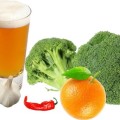
As a mom of two, I know the importance of healthy eating and following a proper diet during pregnancy, as well as foods to eat while breastfeeding. Consuming certain foods can either have a negative or positive effect on your health and your baby’s health while you are expecting and after delivery.
It is extremely easy to once again reach for those fatty, sugary treats or drinks after your new bundle of joy is born. For me, it was an ice cold Dr. Pepper and the greasiest slider from the nearest fast food restaurant. While you can have a bit more dietary freedom after your baby's birth, you still must be vigilant of the things you consume that may be passed on to the baby during breastfeeding. A well-rounded diet can also keep your body strong and increase your stamina level, which we all know is important for us as busy, new moms!
An increase in calorie intake is recommended during breastfeeding, however, there is no “magic” amount to which you must adhere. On average, a new mom naturally feeding her newborn will need approximately 300 to 500 additional calories during a day. We need to keep in mind that our bodies are naturally designed to produce and provide a sufficient amount of milk, but eating the right foods can increase vital nutrients in our system as well as our baby's.
As a new mom, you should listen to your appetite. In other words, eat when you are hungry and eat in moderation. Generally speaking, include foods that are rich in iron and high in fiber. Try to minimize sugar, salt and fatty foods.
Beginning Your Day with Breakfast
The right way to start off the day is with a proper breakfast. I am not a huge breakfast person; I have a horrible habit of skipping it and waiting for lunchtime. However, when I became a new mom I have had to reprogram that way of thinking. Breakfast is truly the most important meal of the day and there are several foods that can enhance a mother's milk during breastfeeding.
Oatmeal is a perfect example of a powerful, complex carbohydrate. It can make you feel fuller and stay satisfied longer. The oats themselves are also packed with fiber, protein and iron. Whole grain cereal with low fat milk is also an ideal combination as it blends a needed dose of dairy with a range of grains. Scrambled eggs, whole wheat toast and yogurt filled with berries or dried fruit are great options as well. If you are like me and enjoy the occasional run through a local drive thru, opt out of sugary pastries. Instead choose a flavored, fresh bran muffin.
Loving Lunchtime
Lunches can be quick and simple. It is a good time of day to enjoy a small meal while not requiring such extensive preparation as dinner. Lunch time can be fun and easy for breastfeeding moms. A peanut butter sandwich on whole grain bread brings back childhood memories while being healthy and nutrient charged. Salads are another convenient option for lunch and they provide a number of options by encompassing a vast selection of ingredients or toppings. Adding beans, peas, various nuts, seeds, hard boiled eggs and even cheeses can help you create a powerful mix as part of your diet. If you must grab something quick, think about cut up veggies dipped in salad dressing or a fruit salad easily tossed together.
Doing Dinner Right for New Moms
Dinner can be a bit trickier as we have to prepare a meal for not only ourselves, but other members in our family. One of the best overall tips is to cook with poly or mono unsaturated fat cooking oils. These can include canola oil, olive oil and the increasingly popular coconut oil. In fact, coconut oil contains high levels of lauric acid which is similar to that found in breast milk. When planning your main dish, always choose lean meats. They are rich in vitamin B-12 as well as protein and are a much healthier choice for anyone. Be sure to remove the fatty areas before preparation.
Salmon is by far one of the most nutrient packed foods available. It is loaded with DHA, which provides benefits for you as well as baby. DHA is crucial to the proper development of a baby's nervous system while helping to prevent postpartum depression for you. Salmon is extremely low in mercury, which makes it one of the safest types of fish to consume. A dinner planned around salmon is a winning combination.
Snacks Keep Your Body on Track
Lucky for us, there is a vast selection of snacking options that are perfectly okay to eat during breastfeeding. In fact, they can help add nutrients, vitamins and much needed energy to our body throughout the day. Below, I have listed a few choices that can easily be added to any daily diet.
![]() Fruit — Apples are perfect options because they are available year round. Blueberries are extremely satisfying and full of minerals and positive carbohydrates. Eat them alone or cut them up and add to yogurt. Avocados are ideal as they are a natural source of folic acid along with Vitamins E & C. They are said to increase lactation as well, which is an added bonus! Just be sure to wash or peel fruits and veggies. This can rid the foods of harmful pesticides.
Fruit — Apples are perfect options because they are available year round. Blueberries are extremely satisfying and full of minerals and positive carbohydrates. Eat them alone or cut them up and add to yogurt. Avocados are ideal as they are a natural source of folic acid along with Vitamins E & C. They are said to increase lactation as well, which is an added bonus! Just be sure to wash or peel fruits and veggies. This can rid the foods of harmful pesticides.
![]() Trail Mix — Trail mix can be the ultimate mix up of body boosting ingredients! Nuts, dried fruit, seeds, and other tasty morsels make up an optimal snack. I often throw in a few pieces of dark chocolate to boost the antioxidant intake as well as satisfying my sweet tooth!
Trail Mix — Trail mix can be the ultimate mix up of body boosting ingredients! Nuts, dried fruit, seeds, and other tasty morsels make up an optimal snack. I often throw in a few pieces of dark chocolate to boost the antioxidant intake as well as satisfying my sweet tooth!
![]() String Cheese — Quick and convenient, string cheese is a snack that provides an important serving of dairy in a tiny package. It is also a food that can be eaten with one hand, leaving the other free to tend to a potentially fussy baby!
String Cheese — Quick and convenient, string cheese is a snack that provides an important serving of dairy in a tiny package. It is also a food that can be eaten with one hand, leaving the other free to tend to a potentially fussy baby!
There are definitely foods and beverages that should NOT be consumed while breastfeeding or at least done in moderation. Alcohol and caffeine should be drank in moderation and in small amounts. High levels can have a negative impact if transferred to your new baby. One simple rule is water, water and more water. Your body needs an abundant amount of water to stay hydrated and performing its best. Orange juice is also a wonderful drink option, full of beneficial ingredients. I prefer no pulp, but any texture provides the same result.
Just like in pregnancy, you should be vigilant of the various types of fish and their levels of mercury. High levels of mercury can damage the development of an unborn or newborn's fragile nervous system. If you notice that your baby becomes irritable or develops colic, keep track of what foods you have consumed. There may be a direct relationship.
Variety is the key to a satisfying a proper daily diet. As a busy, breastfeeding mother you may feel like you do not have time to make healthy choices. However, most nutritional options can be prepared quick and easily. Finally, ask your doctor if you need supplements and their professional input on the best foods to eat while breastfeeding.









 Facebook
Facebook Twitter
Twitter